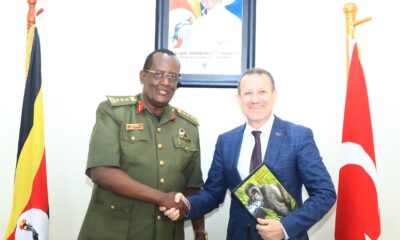
Prosecution re-examines police witness after defence lawyers poked holes in his testimony
The prosecution on Wednesday re-examined Andrew Mubiru, a police witness who has in the past three weeks undergone intense cross examination by defence lawyers.The purpose of re-examination is to enable the witness to explain and. clarify relevant testimony which may have been weakened or obscured in cross-examination.Mubiru, the police forensics director, who presented key evidence the state intends to rely on against the late Katanga’s widow Molly Katanga, faced tough times in the witness stand at the hands of the defence lawyers.Defence lawyers led by Mac Dosman Kabega, a former director of Public Prosecutions, and Elison Karuhanga from Kampala Associated Advocates, accused the head of police forensic science of presenting a report in court based on samples that were not collected from the crime scene.The defense lawyers also alleged potential discrepancies in forensic evidence analyzed.Eveidence on court record indicate that Mubiru stepped out of the standard operating procedures in criminal investigation to irregularly collect own DNA samples and include them in the trove of evidence in murder trial of Ms Molly Katanga.Dr. Mubiru, the eighth witness the prosecution put to the stand remains the subject of intense cross-examination by the defence team – for many reasons.As the trial of Ms Katanga resumed before Justice Isaac Muwata of the Criminal Division of the High Court, the defence team continued to pick him apart as they made every push count in their attempt to prove that she was more of a domestic violence victim than a killer.Dr. Mubiru, the eighth witness the prosecution put to the stand a month ago, remains the subject of intense cross-examination by the defence team – for many reasons.As the trial of Ms Katanga resumed before Justice Isaac Muwata of the Criminal Division of the High Court, the defence team continued to pick him apart as they made every push count in their attempt to prove that she was more of a domestic violence victim than a killer.The forensics examiner told the court that the police had not supplied him with any samples.The defense lawyers suggested that Mubiru acted beyond the scope of the instructions given to him by police investigators regarding the samples to be tested for DNA in the case.The defense also pointed out to the court that since Mubiru admits that the swab he took from the trigger of the pistol was consumed in the laboratory, there is no exhibit of such a sample before the court.Mr Kabega then closed the defense team’s cross-examination but notified the court that at an appropriate time, during the visit to the scene of the crime at the Katanga home on Chwa II Road in Mbuya, Mubiru would be recalled for further cross-examination.The trial continues to unfold, with the prosecution expected to call additional witnesses to support their case, while the defense maintains a focus on procedural lapses and the handling of forensic evidence.Defense attorneys had previously accused him of examining a gun from a different case, not the alleged murder weapon. Counsel Kabega presented startling evidence, suggesting Mubiru analysed a pistol with a different serial number, contradicting the prosecution’s claims.During one of the instense cross examination session Kabega also claimed that a number exhibits and items were deliberately left for analysis because they would reveal that A1 (Ms. Molly Katanga) was badly assaulted.Lawyers and other experts have previously urged that Molly is a victim of domestic violence.“You were at the scene of crime; these were items of assault, and you didn’t do a DNA. I want to suggest to you that you deliberately left them because they would reveal that A1 was badly assaulted,” said Kabega.Evidence on court record shows that a shocking array of weapons was recovered from the master bedroom of Molly and Henry Katanga, including four sticks, a baton, and a pistol.Mr. Mubiru confirmed to court that Molly’s blood was found extensively throughout the bedroom, bathroom, balcony, and ceiling, with gruesome pieces of her skull and skin discovered on the bedroom door hinge.The court was shown the exhibits, which included three wooden sticks, a wooden baton, and a metallic walking stick with a curved handle.A pistol was also recovered from the scene, which Mubiru described as an “armory.”Kabega also presented additional evidence, seeking to cast doubt on the prosecution’s case. Kabega tendered hard copies of the software used in Mubiru’s examination analysis, highlighting that the software was outdated and prone to inaccuracies.He also referenced the crime scene procedure manual management by the Directorate of Forensic Services, which Mubiru admitted to during cross-examination.Kabega aimed to demonstrate non-compliance with procedural guidelines for handling evidence, potentially leading to contamination within the lab.Molly Katanga on trial over a lleged murder of her husband while her daughters Patricia Kakwanza and Martha Nkwazi, their shamba boy George Amanyire, and nursing officer Charles join her in the dock as accomplices after the murder.https://www.ugbulletin.co.ug/prosecution-re-examines-police-witness-after-defence-lawyers-poked-holes-in-his-testimony/
News
Ugandan Citizen Abducted, Held in Secret Detention for Three Months, Sparks Outrage and Calls for Justice

A disturbing new case of unlawful detention has surfaced, highlighting the ongoing human rights crisis in Uganda. A Ugandan citizen was reportedly abducted and held in a secret facility, known as a “safe house,” for three months, only to be released without charge or explanation. This incident, reported by NTV Uganda, has sparked widespread condemnation and renewed calls for accountability regarding human rights abuses in the country.
While the details surrounding the abduction remain unclear, reports indicate that the individual was taken without due process and held incommunicado—an action that has long been condemned by human rights organizations. The victim’s release, with no charges filed and no clear justification, has angered activists and citizens, who view this as yet another case of egregious abuse of power by the state.
“This is a recurring pattern,” said one human rights activist. “Abductions, secret detentions, and unexplained releases have become all too common in Uganda. These acts violate fundamental human rights and erode public trust in the justice system.”
The use of “safe houses,” unregistered detention facilities reportedly operated by security forces, has been a focal point in numerous allegations of torture and illegal imprisonment. Despite repeated calls from both local and international organizations for their closure and accountability for those involved, little action has been taken to address these violations.
This case underscores the urgent need for reform within Uganda’s security apparatus and greater accountability for human rights abuses. Observers hope that drawing attention to these injustices will spur concrete action to bring those responsible to justice and ensure the protection of basic human rights.
As frustration mounts, calls for both domestic and international pressure to hold the government accountable for such crimes grow louder. “One day, there must be accountability for all these crimes against our people,” stated one social media user, reflecting the sentiments of many Ugandans.
News
NUP Gathering Disrupted: Kyagulanyi Alleges Security Force Harassment and Arrests

National Unity Platform (NUP) President Robert Kyagulanyi has accused Ugandan security forces of using excessive force to disrupt a planned NUP gathering. The allegations were detailed in a statement shared on Twitter, following an event held to honor children of NUP supporters who were killed, disappeared, or detained for their political beliefs.
According to Kyagulanyi, security personnel, under the command of an officer identified as Asiimwe, carried out a preemptive operation early in the morning upon learning of the NUP’s plans. The forces allegedly stormed the premises, arrested workers, and deployed tear gas to disperse those present.
“The criminals under the command of one Asiimwe deployed early morning, arrested our workers, and threw tear gas into our premises. They’ve cordoned off the premises and blocked all people from accessing the place,” Kyagulanyi wrote.
Among those reportedly arrested were Saava Peter, Mudenya Samson, and Turyasingura Samson. Kyagulanyi claimed the detained workers were subjected to beatings and interrogated about their political affiliations, with security operatives labeling them as terrorists.
“These JATT operatives asked the workers who they support politically, branding them terrorists and criminals—their only crime being that they work with us. You can imagine the indignity!” Kyagulanyi lamented.
This incident adds to the growing tension in Uganda’s political climate, where opposition parties frequently accuse the government of stifling dissent. Despite the challenges, Kyagulanyi ended his statement with a message of defiance and optimism, proclaiming, “UGANDA WILL BE FREE.”
NUP Gathering Disrupted: Kyagulanyi Alleges Security Force Harassment and Arrests
News
Sudan Demands Apology from Uganda Over Army Chief Muhoozi Kainerugaba’s Threat to Invade Khartoum

Sudan has demanded an official apology from Uganda over “offensive and dangerous” comments made by the chief of Uganda army staff, who threated to invade Khartoum, the Sudan Tribune has reported.
General Muhoozi Kainerugaba, son of Ugandan President Yoweri Museveni and CDF of the Ugandan army, posted two comments on the X platform on Tuesday in which he threatened “to capture Khartoum” with the support of the US President elect Donald Trump after he takes office. The posts were deleted later.
“The government of Sudan demands and official apology from the Ugandan government for the offensive and dangerous comments of the army commander,” Sudan’s foreign ministry said in a statement that the Sudan Tribune said it has seen.
Sudan Demands Apology from Uganda Over Army Chief Muhoozi Kainerugaba’s Threat to Invade Khartoum







